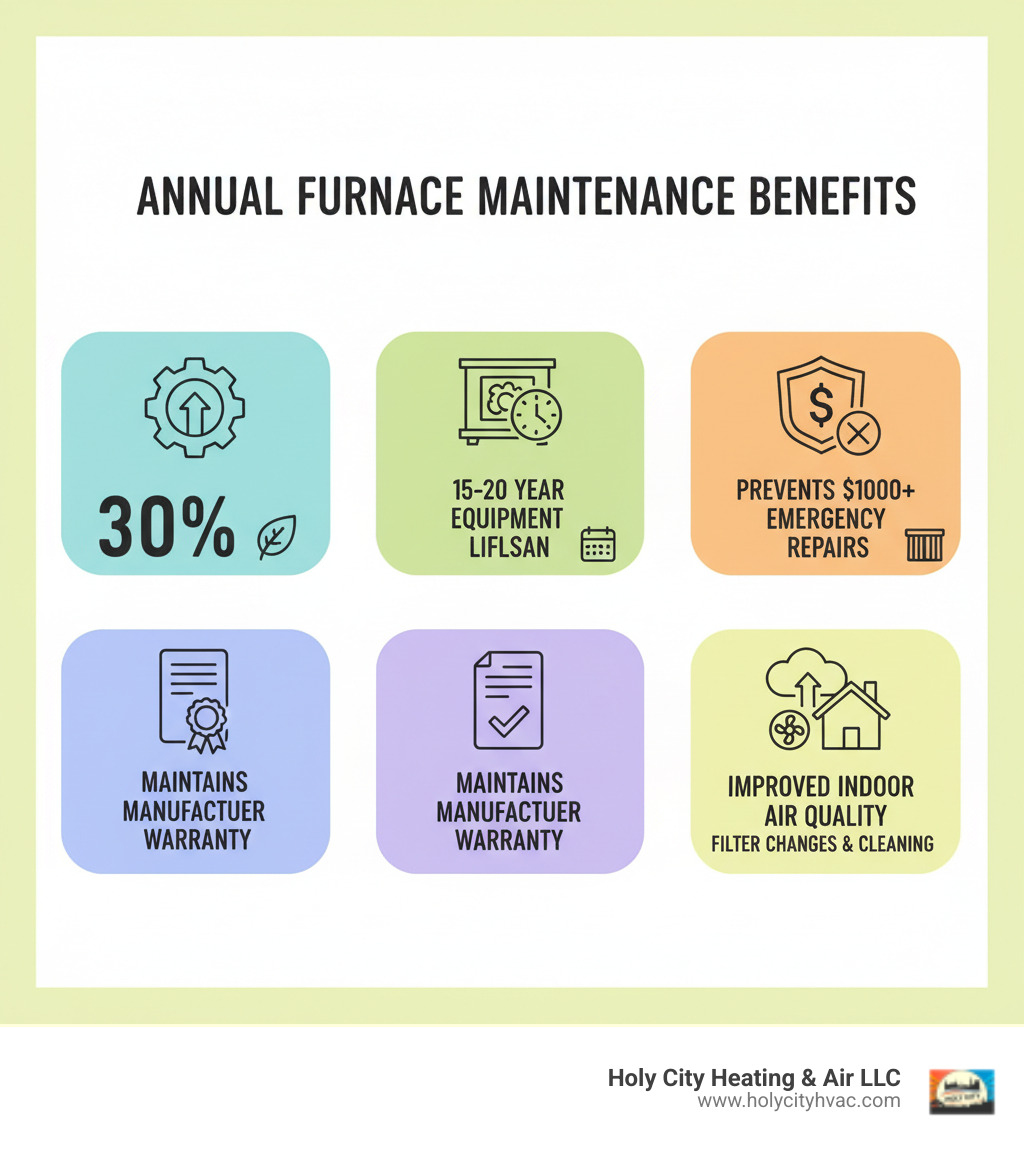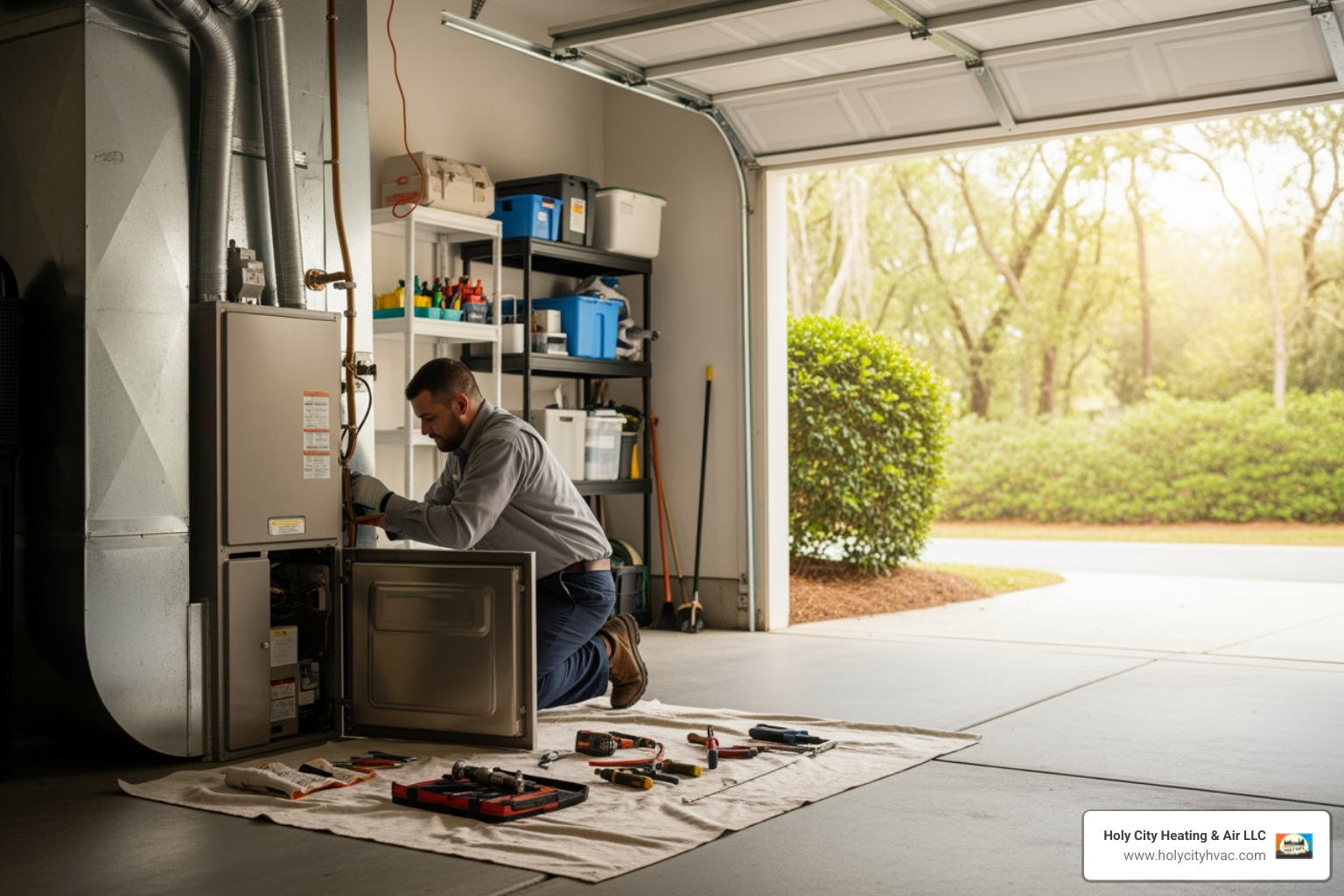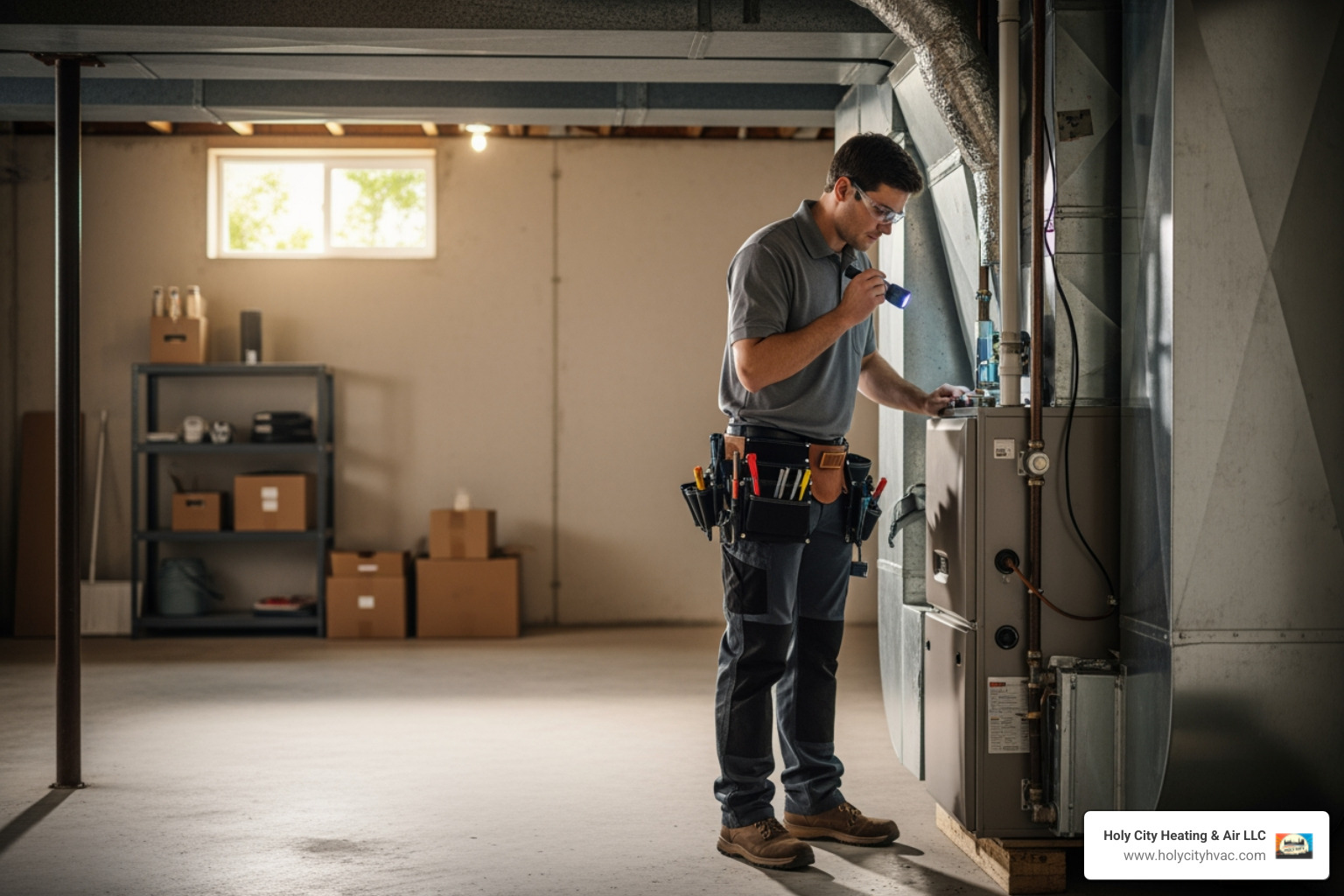Understanding Furnace Service Value
When your furnace starts making strange noises or one room feels colder than others, you might wonder if professional service is necessary, especially when managing household expenses. The cost to have furnace serviced is a valid concern, but it's crucial to look at it as an investment rather than just an expense.
The reality is that regular furnace maintenance isn't just about keeping your system running today. It's about preventing costly emergency repair calls that happen at the worst possible time—like the coldest week of winter.
The value equation is simple. A typical annual tune-up is a minor investment compared to the high price of an emergency service call. More importantly, it helps your furnace run efficiently (lowering your monthly utility bills), extends its lifespan by years, and catches small problems before they become major repairs.
However, not all service visits are created equal. Understanding what you should expect from a professional tune-up helps you make smart decisions about your home comfort investment. Different service levels are available, from basic inspections to comprehensive tune-ups and annual maintenance plans, each offering a different scope of work.

Cost to have furnace serviced terms at a glance:
What's Included in a Professional Furnace Tune-Up?
When a technician arrives for your furnace tune-up, they perform a detailed, systematic examination of every component. Think of it as a comprehensive physical for your furnace, designed to optimize performance, extend its lifespan, and catch small issues before they become expensive problems.
A proper tune-up covers dozens of critical points. Key tasks include:
- Safety and Calibration: We test all safety controls, calibrate the thermostat for accuracy, and perform carbon monoxide testing to ensure no dangerous gases are leaking into your home.
- Cleaning and Inspection: We thoroughly clean burners and flame sensors to prevent unexpected shutdowns. We also inspect and tighten all electrical connections to improve efficiency and reduce fire risk.
- Airflow and Drainage: The blower components (motor, fan, belt) are checked for wear to ensure proper airflow. For high-efficiency units, we clear the condensate drain to prevent clogs and water damage.
- Fuel System Integrity: For gas furnaces, we verify gas pressure is at optimal levels and inspect the heat exchanger for cracks, a critical step to prevent carbon monoxide leaks. We also check all vent connections to ensure proper exhaust.
- Mechanical Maintenance: Finally, we lubricate all moving parts to reduce friction and wear, a simple task that can significantly extend your furnace's life.
According to Energy Star's maintenance checklist, a contractor should at minimum verify thermostat settings, tighten electrical connections, replace dirty filters, check all gas or oil connections, verify proper gas pressure, and ensure burners are clean. Our comprehensive service goes well beyond these baseline recommendations to give you complete peace of mind.
For more details on why this regular attention matters so much, explore our guide on furnace needs regular maintenance.
Basic vs. Comprehensive Service Levels
Not all tune-ups are created equal. A standard inspection typically involves a thorough visual examination and a diagnostic report, which is a solid choice for newer, well-maintained furnaces. An advanced tune-up goes further, including essential hands-on work like filter replacement and basic system cleaning. This is what most homeowners expect from an annual service.
A deep cleaning addresses stubborn dirt in the blower wheel and combustion chamber. While not needed every year, we might recommend it every few years for older units or systems that run heavily to restore performance.
A Closer Look at Key Service Tasks
Some tasks during a tune-up deserve special attention because they directly impact your safety and the long-term cost to have furnace serviced.
The heat exchanger inspection is a critical safety measure. This component keeps combustion gases separate from your breathable air. A small crack can allow carbon monoxide to leak into your living space. We use specialized tools to examine it carefully.
Carbon monoxide testing with precise detectors is non-negotiable. This colorless, odorless gas is a byproduct of fuel-burning furnaces, and our job is to ensure none of it is escaping into your home.
The gas pressure check ensures your furnace burns fuel efficiently. Incorrect pressure wastes energy, causes premature wear, and can create safety issues. Getting this right means lower utility bills and fewer repairs.
Finally, lubricating moving parts is a simple but effective step. It prevents premature wear on components like the blower motor, helping them last years longer and saving you from costly replacements.
These detailed tasks work together to keep your heating system healthy and reliable. For more insights into addressing common issues before they become emergencies, check out our article on common heating repair challenges.
Key Factors That Influence Furnace Service Costs
The cost to have furnace serviced isn't one-size-fits-all. Several factors influence the final investment, and understanding them helps you know what to expect.

- System Accessibility: A furnace in a spacious utility room is easier and faster to service than one in a cramped attic or crawl space. Difficult access requires more time and effort.
- Time of Year: Scheduling a tune-up during the off-season (spring or early fall) often provides more flexible appointment times. During peak winter, demand is higher, and emergency calls take priority.
- Service Level: The scope of work you choose matters. A basic inspection is less involved than a comprehensive tune-up that includes deep cleaning and multiple adjustments.
- Warranty Status: If your furnace is under warranty, some parts may be covered if a problem is found. However, most warranties require documented annual maintenance to remain valid. Skipping tune-ups can void your warranty, leaving you responsible for the full cost of parts.
How Your Furnace Type Affects Service Needs
Your furnace type directly impacts the service it requires.
- Gas furnaces, the most common type, are also the most complex to service. They involve combustion, requiring us to inspect gas lines, test pressure, clean burners, and perform critical carbon monoxide testing for your safety.
- Electric furnaces are more straightforward. With no combustion, service focuses on electrical connections, heating elements, and the blower system, often resulting in a more streamlined visit.
- Oil furnaces require specialized attention. They produce soot that needs thorough cleaning, and we must check oil lines, nozzles, and fuel filters.
The Impact of Age and Condition
A system's age and history play a big role in its maintenance needs.
Older units naturally need more attention. Components wear down, so an older furnace typically requires more adjustments and closer inspection to maintain peak performance.
Well-maintained systems with a history of annual care run smoother and rarely have surprises, often resulting in faster service visits. We watch for signs of wear and tear, like strange noises or corrosion, to address small issues before they become emergencies.
If our inspection reveals repair needs beyond routine maintenance—like a failing sensor or a cracked heat exchanger—we can address them on your terms, not during a midnight emergency. This is where regular care truly shines. For more insights on how consistent maintenance extends your system's life, check out our article on furnace repair ensures longevity.
The Hidden Costs of Skipping Regular Furnace Maintenance
It can be tempting to skip an annual tune-up if your furnace seems to be working fine, but putting off maintenance almost always costs more in the long run. A neglected furnace creates problems that quietly drain your wallet while putting your family at risk.

- Higher Energy Bills: As dust and debris build up, your furnace works harder to heat your home, causing a gradual climb in your utility bills. Regular maintenance can improve energy efficiency by as much as 30%.
- Unexpected Breakdowns: A small issue that a technician could have fixed during a tune-up can escalate into a complete system failure, often on the coldest night of the year. Emergency repairs are significantly more expensive and stressful than preventative maintenance.
- Poor Indoor Air Quality: A dirty furnace circulates dust, allergens, and other contaminants throughout your home. This can worsen allergies and respiratory issues for your family.
Want to understand the real financial impact of putting off furnace care? Our article on the cost to fix a heater in house breaks down what happens when small problems become big ones.
Major Risks of a Neglected Furnace
Beyond the financial headaches, skipping maintenance creates serious safety concerns.
- Complete System Failure: Minor wear and tear can cascade into total failure, potentially shortening your furnace's lifespan by years and forcing a premature replacement.
- Voided Manufacturer Warranty: Nearly every furnace manufacturer requires documented annual professional maintenance to keep your warranty valid. If you skip tune-ups, you could be paying out-of-pocket for a major component failure that should have been covered.
- Serious Safety Hazards: This is the most critical risk. A neglected furnace can develop cracks in the heat exchanger or have blocked flue pipes, allowing deadly, odorless carbon monoxide to leak into your home. The EPA recommends an inspection before each heating season to prevent this. Additionally, frayed wiring, which we check during a tune-up, is a leading cause of furnace fires, as reported by The Washington Post.
The bottom line? The annual cost to have furnace serviced is an investment in your family's safety, comfort, and long-term savings. It's not an expense you can afford to skip.
One-Time Tune-Up vs. Annual Maintenance Plan: Which Offers More Value?
When considering the cost to have furnace serviced, you can choose between a one-time tune-up or an annual maintenance plan. Both have their place, but they offer different value for your home and wallet.

Benefits of a Maintenance Plan
For homeowners who rely on their HVAC systems year-round, a maintenance plan typically offers the best long-term value and peace of mind. Key benefits include:
- Priority Service: When something goes wrong, plan members move to the front of the line, which is crucial during a mid-winter breakdown.
- Discounts on Repairs: Most plans include discounts on both parts and labor, which can lead to significant savings if a repair is needed.
- Included Tune-Ups: Plans typically cover both your heating and cooling systems with scheduled tune-ups, so your entire HVAC system gets the attention it needs without you having to remember to book it.
- Budgeting and Peace of Mind: A plan allows for predictable maintenance costs and provides the assurance that your system is running efficiently, safely, and is less likely to fail.
For guidance on selecting the service approach that fits your home's needs, take a look at our article on choosing the right heating service.
When a One-Time Tune-Up Makes Sense
While maintenance plans offer comprehensive protection, a one-time service call is sometimes the better fit.
- For Newer Systems: If your furnace is only a year or two old, a single annual tune-up may be all that's needed to keep it running smoothly and maintain the warranty.
- For Pre-Sale Inspections: A one-time service provides documentation that your furnace is in good working order, which can be a strong selling point for potential home buyers.
- To Address a Specific Concern: If you've noticed an odd noise or a specific performance issue, a one-time call allows us to diagnose and fix the problem without a long-term commitment.
Even a single tune-up is a smart step toward maintaining your home's comfort. If you're curious about the benefits of a pre-season check, our guide on kicking off the year with a heater tune-up has helpful insights.
Frequently Asked Questions about Furnace Servicing
Understanding your furnace can be tricky. Here are answers to the most common questions we hear from Charleston homeowners about furnace servicing.
How often should a furnace be tuned up?
The straightforward answer is at least once a year. Industry experts, manufacturers, and the EPA all agree on this schedule. We recommend a tune-up in the fall before the heating season begins. Annual maintenance is the baseline for keeping your system efficient, safe, and reliable. The EPA specifically recommends having fuel-burning furnaces inspected and serviced before each heating season to protect against carbon monoxide poisoning.
What are the signs my furnace needs service?
Your furnace will often give you clues when it needs attention. Look out for these signs:
- Strange Noises: Banging, rattling, squealing, or grinding sounds are not normal and indicate a problem.
- Uneven Heating: Some rooms being cold while others are warm suggests your furnace is struggling.
- Increased Energy Bills: A sudden, unexplained spike in heating costs often points to inefficiency.
- Yellow Pilot Light: For gas furnaces, a yellow or flickering flame (instead of a steady blue one) is a serious safety concern that requires immediate attention.
- Frequent Cycling: The system turning on and off in short, repeated bursts is a sign of an issue.
- Unresponsive Thermostat: If your home won't reach the set temperature, it's time for a professional look.
Can I perform furnace maintenance myself?
While homeowners should absolutely handle basic tasks like changing the furnace filter regularly (every 1-3 months) and keeping the area around the unit clear, comprehensive maintenance should be left to certified professionals.
Furnace work involves gas lines, electrical components, and complex mechanical parts. Attempting to service these yourself poses serious safety risks, including gas leaks, electrical shock, and fire hazards. Our licensed technicians have the specialized tools, training, and diagnostic equipment to do the job safely and effectively. Furthermore, most manufacturer warranties require documented professional service to remain valid.
So yes, change that filter. But when it comes to the professional cost to have furnace serviced, view it as a necessary investment in your safety, efficiency, and warranty protection.
Your Investment in Home Comfort and Safety
When you consider the cost to have furnace serviced, you're not just paying for a task—you're investing in your family's warmth, safety, and peace of mind. Proactive maintenance is insurance against the stress of emergency repairs, unsafe conditions, and high utility bills. A well-maintained furnace runs efficiently, lasts longer, and keeps your home comfortable all winter.
At Holy City Heating & Air, we understand what's at stake. As a family-owned company serving Charleston since 2015, we bring over 20 years of industry expertise to your home. Our EPA-certified, licensed professionals are your neighbors, rooted in this community and dedicated to your comfort and safety. We combine the resources of a growing company with the personal care you deserve, ensuring you receive best service every time.
Don't wait for a breakdown to think about your furnace. A little preventative care today saves you from major headaches tomorrow. Your heating system works hard for you—give it the professional attention it deserves.
Schedule your professional heating service in Charleston, SC today and experience the Holy City Heating & Air difference. Because your family's comfort isn't just our business—it's our priority.
Recent posts




















